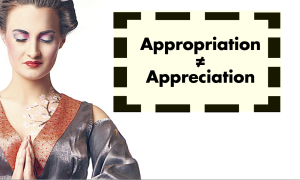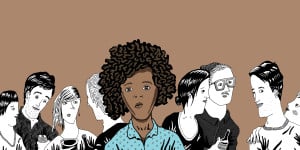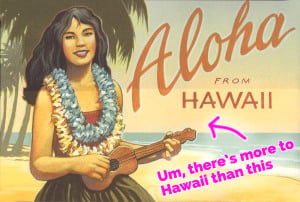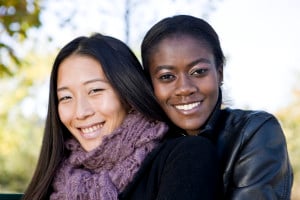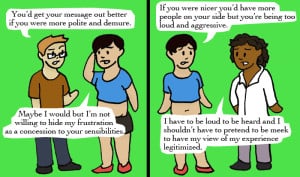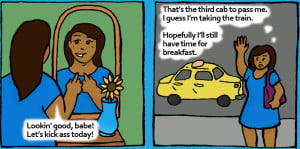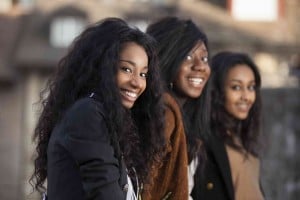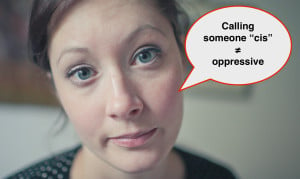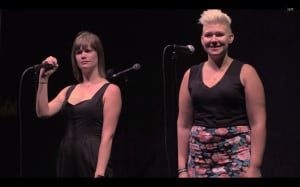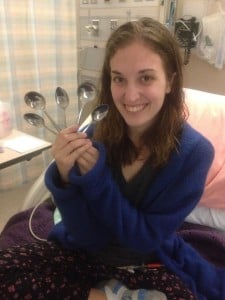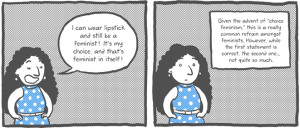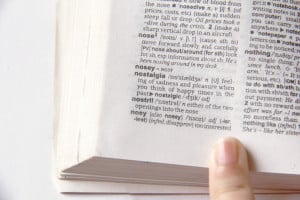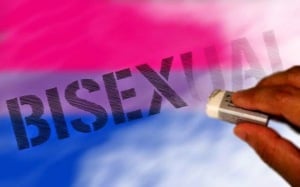
Source: BiNet USA
This year, Bisexual Awareness Day/Celebrate Bisexuality Day was on September 23rd.
That same day, the National LGBTQ Task Force thought it’d be a good idea to post an article entitled “Bye Bye Bi, Hello Queer,” in which leadership programs director Evangeline Weiss said “she is ready ‘to say bye bye to the word bisexuality.’
She said it does not describe her sexual orientation, and she encouraged readers to cease using the word as well as she felt it reinforced a binary concept of gender.
Let me drive that home a little more. The National LGBTQ Task Force not only thought it would be a good idea to publish an article insulting, misrepresenting, and forsaking the bisexual letter in their own name, but did so on Celebrate Bisexuality Day.
Rude.
And a fantastic example of the constant, ongoing erasure bisexual people have to deal with. This one just happened to be incredibly blatant.
What happened as a result of that article? People got pissed.
People got so pissed that the Task Force not only removed the article from their website, but posted in its place this non-apology (it keeps being referred to as an apology, but I’m not so easily pleased): “Having listened to a wide array of feedback on the timing and content, we recognize that this blog offended people. For this we sincerely apologize. It has been removed.”
In other words, “Sorry you got pissed off. Hopefully you’ll shut up if we take it down.” Which, as far as I can tell, isn’t much of an apology for a blatant disregard of an entire community of people.
Misunderstanding of the bisexual community has been the crux of biphobia’s history and the ongoing battle to erase bisexuality from the LGBTQIA+ community.
It’s a scary time to be bi, especially when your lesbian, gay, pansexual, and queer siblings and allies are calling for your blood simply because they’ve fallen victim to the mainstream agenda without realizing it. (Say what?! Jump to #5.)
It’s time for a change.
It’s time for all of us to properly understand one another and to — hope of hopes — become allies for our incredibly similar endeavors. To help initiate that friendship, I ask you, dear reader, to go through the following three steps.
Step 1: Look below. If I’ve played my cards right, virtually every reader should find at least one category with which they identify.
Step 2: Approach your designated section(s) with an open mind, an unprejudiced heart, and a desire to further enhance your own community/ies. It’s difficult for people to learn new things and see different views if they automatically approach them with resistance, which is often the case with bisexual topics.
Step 3: See how bi erasure hurts you as a person and, while you’re at it, likely hurts the people you care about. Because it really is happening.
So here are five ways in which bi erasure is hurting people of layered identities.
1. Female-Identified People and Feminists
Bisexuality is one of the only non-monosexual* identities currently recognized in the English-speaking world. If bisexuality is kept underground, it suppresses our limited, precious resources for open discussion about non-monosexuality. This hurts female-identified people and feminists regardless of their sexual orientation.
To this day, female-identified people can’t get a fair shake. Pay is unequal, birth control access is limited, and objectification is a daily thing. Non-monosexual women in particular are often not taken seriously because they’re seen as sluts, greedy, or unable to make up their minds.
Also, the general fetishizing of women is particularly intensified in the bisexual realm by (straight-identified) men, turning the very act of women’s sexual freedom, empowerment, and self-expression into nothing more than something for male gazes. (This is most often seen through the relentless prompts for female-female-male threesomes and masculine catcalls in bars when two femme-appearing women make out.)
By participating in or casually allowing bi erasure to happen, we’re ignoring the specific plights and abuses of bisexual women, thereby contributing to the ongoing problem of female inequality, objectification, and silence.
As feminists, we can’t pick and choose which women to fight for. The complexities of womanhood — and all of its cultural suppressions — are an all-or-none deal.
*Note: Non-monosexuality usually refers to someone who is interested in more than one sex or gender. (In other words, somebody who isn’t gay, lesbian, or straight.) Another way to say “non-monosexuality” would be “polysexuality” to help keep it from sounding negative.
2. Male-Identified People and Male Liberationists*
Just like with female-identified people and feminists, bi erasure hurts male-identified people and male liberationists regardless of their sexual orientation.
Allow me to make this pretty basic: Men continue to be fed the message that being gay is bad. Being gay means you’re not really a man, which means you lose your dude membership and the bulk of your male privilege. And since gayness equals the slightest shred of attraction to or intimacy with another male, all manners of bromance must be squashed.
In short, many guys live in a state of silent terror in this regard.
Bi men are afraid of being banished from the world of lady-loving, gay men are worried about losing all of their connections to hetero land, and nothing is worse for a straight man than being called a fag.
Constant monitoring, constant filtering, constant stress: Is this really the kind of world we guys want to keep living in?
By being able to talk about bisexuality — remember: one of our only non-monosexual identities — male-identified people can begin to break free from the masculine ideal.
Bi talk helps bridge the gap between being a man (straight) and not being a man (gay) and realizing, hey, having some manner of attraction to or intimate interaction with another guy is totally okay, masculinity unscathed.
Gay men can begin to regain their identities as men, bi men can finally start coming out, and “fag” will lose its strength as an insult from one straight man to another.
*Note: Male liberationists are more or less seen as allies to feminists and vice versa. Both will argue that patriarchy is bad, but while feminists talk of how it’s bad for females, male liberationists talk of how it’s bad for males. Examples include the inability to romantically or sexually love another male, the emasculation of men of color, and the physical, verbal, and mental abuse that comes from society’s expectations to be stereotypically masculine.
3. People Who Identify as Trans Sexual, Trans Gender, Genderfluid, Genderqueer, or Gender Non-Conforming
This one’s pretty easy. Some people on the trans spectrum identify as bisexual. But then they’re told they can’t or that it’s an insult to their trans siblings because bisexuality is believed to be trans-exclusive.
The problem with bi erasure is it adds to the ongoing problem of cis people — LGQ or not — telling trans people what to think. Cis people have a bad habit of thinking they need to speak for people on the trans spectrum even when trans people are quite capable of speaking for themselves. This is even more frustrating when it comes from a community supposedly meant to support them.
Despite the personhood for which they’re continuing to fight, trans people can receive backlash from the lesbian, gay, and queer communities as their identities and bodies are turned into political battlegrounds.
Sometimes, they’re used without consent by some cis individuals so that points can be made for non-trans-specific agendas, and sometimes they’re ironically used in the attempts for cis identities to help better the trans worlds.
For instance, automatically dismissing bisexuality as trans-exclusive and guilting any person on the trans spectrum that wants to identity as bisexual, if I may make so fine a point.
As blogger Aud Traher writes, “If you want to support trans people like me, don’t erase me or speak over me or cause me harm out of self-righteous biphobia. Look into yourself and deal with that internalized biphobia and then help others get over theirs. Don’t advocate for the destruction of a community in the name of ‘saving’ it. And, especially, don’t do it in my name.”
4. People Who Identify as Gay, Lesbian, or — Yes — Straight
Quite simply, it makes gays and lesbians (and straight people) look bad, too.
Bisexual people get a bad rap for apparently upholding the gender binary by saying they love only (cis) men or (cis) women, but isn’t that pretty much exactly what gays, lesbians, and straight people are saying when they identify as gay, lesbian, or straight? That they’ll only love either (cis) men or (cis) women?
But where’s their rampant backlash from the rest of the community for upholding the gender binary? I’m just sayin’.
Even when these groups extend their definitions to include trans people and people on the gender non-conforming spectrum, it’s often still as long as those trans people exhibit some manner of gender representation that falls into the lover’s category of desire.
Now, I’m honestly not trying to rag on gays, lesbians, or even straight people. They have as much right to identify how they want as anybody else. And there’s nothing wrong with feeling primarily attracted to only, say, cis or trans men if your brain simply tells you that you only like guys. That’s fine. Go ahead and do that. I’m not saying you can’t.
What I am saying is you can’t be spewing bi hate or letting bi erasure slide because 1) it’s incredibly one-sided and unfair, and 2) in the end, it’s making you look bad, too.
What do you think will happen if bi erasure is a success? You’ll be next, dears.
*cue Jaws theme*
5. People Who Identify as Queer, Pansexual, or Another Fellow Non-Monosexual
In late October, Lizzy the Lezzy — who I quite enjoy, by the way — shared a photo on her Facebook timeline explaining sexuality in terms of guests at a BBQ.
This would be all well and good if it didn’t include a glaring misconception about bisexual people, especially when compared to pansexuals. While bisexual people were defined as getting both hot dogs and hamburgers, pansexuals were defined as getting hot dogs, hamburgers, “and a salad.” Oops. What year is this again?
I’m going to make something very plain to you, dear reader: Bisexual people don’t just love (cis) men or (cis) women. That’s not how the ballpark definition goes. The “bi” in “bisexual” does not indicate a binary. Well, okay, it does indicate a binary, but probably not the one you think.
Instead of “bi” meaning a love for only cis men or cis women or otherwise putting men and women at two opposite ends of a spectrum, “bi” means a love for identities bisexual people identify with themselves and identities that they don’t.
Or, as the popular Robyn Ochs definition goes: “I call myself bisexual because I acknowledge that I have in myself the potential to be attracted – romantically and/or sexually – to people of more than one sex and/or gender, not necessarily at the same time, not necessarily in the same way, and not necessarily to the same degree.”
Look at that very closely. That’s still a binary. That’s still “bi.” And there isn’t a thing wrong with it, no exclusion to be seen.
When compared with the general concepts of pansexuals and queers, our orientations suddenly sound pretty darn similar: We love everyone.
Bisexual people get a bad rap for apparently being transphobic. While we’ve already seen a little bit in #3 as to why we aren’t, I want to further drive the point home here. A large portion of the transphobic accusations toward us come from the queer and pansexual communities, which in turn seem to derive from some serious misinformation and misdirection by the mainstream.
For the record, queers and pansexuals are cool. I like them. But the fact of the matter is that the misconception of the “bi” in “bisexual” as meaning an attraction to only (cis) men or (cis) women — and therefore upholding the gender binary — was created and imposed upon bisexual people by the mainstream. You know, the people that want the gender binary to stick around.
And some queers and pansexuals ate the propaganda they were fed? That’s terrifying. It starts to show just how large and sneaky the mainstream’s gender binary monster truly is.
By defining and erasing bisexuality on the grounds that it upholds the gender binary, pansexuals and queers are not only reinforcing the binary they so sorely wish to dismantle, but they are losing important focus on where the problem actually resides: the mainstream’s insistence to force the gender binary on non-mainstream groups such as bisexual people.
Further, holding bisexual people responsible for the abuse they’ve suffered is simply wrong. All that’s doing is blaming the victim. But, by recognizing and respecting bisexual people as they truly are, bisexual people can not only help dismantle the gender binary and put a new definition on the concept of the spectrum, but finally be allowed to team up with pansexuals and queers to crush mainstream abuse on non-mainstream identities.
Doesn’t that sound nice? I think it sounds nice.
TL;DR
Dear non-bisexual identities, please stop shooting yourselves in the foot and then wondering why you’re missing toes.
We’re here for the same reasons you are: for the right to love whoever we want and for the right for others to do the same.
So let’s finally be friends. We’re never going to get anything done if we keep spending our time putting each other down.
[do_widget id=”text-101″]
Milo Todd is a freelance writer and journalist. He holds a double BA in Philosophy and Gender Theory with focuses in feminist phenomenology, queer phenomenology, and post-positivist realism. Milo otherwise writes LGBTQ-esque fiction and likes to pretend it’ll make him rich and famous. He is a judge in the YA branch of the 2014 Bisexual Book Awards.
Search our 3000+ articles!
Read our articles about:
Our online racial justice training
Used by hundreds of universities, non-profits, and businesses.
Click to learn more





